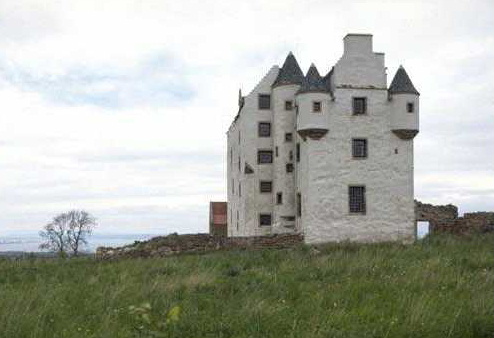
Located in East Lothian, 1 mile (1½ km) southeast of Wallyford and
2 miles (3 km) southwest of the town of Tranent, Fa'side Castle
was built in the 14th Century as a 4 storey keep.
Built on solid rock well above sea
level, Fa'side Castle is a striking and imposing building. Divided into three
parts (one four
storey section to the north, and two six storey sections to the south) the walls
are up to 6 feet
thick and the southern gable end has 50 feet turrets in each corner. The name
Fa'side has various spellings, Ffauside, Fauxside, Fawsyde, Falside and Fawside. The name was
first recorded in the reign of David I (1124-1153). A charter dated 1189 granting land
from the monks of Newbattle Abbey to Saier de Quency (or de Quincy) is
the earliest known
record relating to the lands of Fa'side,
the
de Quinceys lost their land to King Robert I, "the Bruce", after
they gave their support to Edward I of England. Since that time Fa'side has passed
through several
families including the Fawsides, the De Quencys and the Setons,
and the
Hamilton and Dundas of Arniston families.
The tower was burned the day before the nearby Battle of Pinkie.
The occupants had been firing on the English invaders, but when
ammunition ran out, the English set fire to the house, killing all
within.
It was destroyed during the Battle in 1547, but rebuilt with an
'L' plan mansion added next to it in the late 16th century. By 1791, there
was a little village in the vicinity of the castle. The 145 inhabitants came from
mostly mining families and their children were taught in the nearby schoolhouse. This was not
the isolated monument that exists today but a thriving community centered on an
important piece of defensive architecture.
Ruined by the end of the 19th century and on the verge of
demolition in the early 1970s, the castle was saved by a group
chaired by historian Nigel Tranter and underwent a comprehensive
programme of restoration completed in 1982.